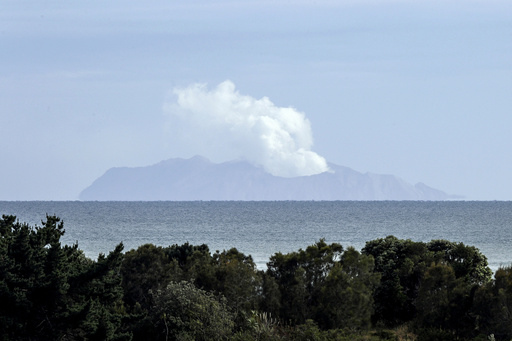
A judge in New Zealand is tasked with determining if the owners of an island volcano experienced a miscarriage of justice after their company was found guilty of failing to ensure visitor safety during an eruption that claimed the lives of 22 tourists and local guides in 2019.
The three-day appeal by the company’s lawyers concluded on Thursday, with Judge Simon Moore stating he intends to deliver a ruling by the year’s end. The company in question, Whakaari Management, operated by three brothers who own the active volcano, Whakaari, also known as White Island, was previously ordered in March to pay substantial fines and restitution to the victims, many of whom were cruise ship travelers from the U.S. and Australia participating in a walking tour.
The central issue of the case revolves around the responsibilities of Whakaari Management as it granted access to the volcano for tourists and scientific groups, charging fees for permits. According to New Zealand’s workplace health and safety laws, any entity in control of a workplace is obligated to manage safety risks for all present, including at entry and exit points.
During the proceedings, a lawyer from New Zealand’s workplace safety regulatory agency stated that Whakaari Management’s core business involved facilitating access to a natural hazard they could not control, asserting that the company should have performed its own risk assessments regarding tourists’ access.
Prosecutor Kirsty McDonald supported the trial judge’s statement, emphasizing that the company bore a responsibility to ensure the safety of its workplace to the extent that it was reasonably possible. Conversely, the company’s legal team argued that their client acted merely as a landlord, rather than overseeing operations on-site, contending that the safety of the site was the responsibility of the tour operators.
This case is significant, as it has already impacted the regulations surrounding New Zealand’s adventure tourism sector, which frequently centers around activities linked to natural hazards. Operators are now required to take every reasonable measure to inform participants of any substantial risks.
Furthermore, the company’s attorneys claimed that affirming the conviction would deter other property owners from permitting tourism activities, a stance that was dismissed by the regulatory body.
White Island, also known as Whakaari in M?ori, was a highly sought-after tourist destination prior to the 2019 eruption, accessed by boat or helicopter from the North Island’s Bay of Plenty. At the time of the eruption, there were 47 tourists and guides present when a surge of superheated steam erupted, killing some instantly and causing severe burns to others.
Survivors recounted emotional testimonies during the trial, revealing they were not warned about the active volcano’s dangers when they paid for their visit. They lacked protective gear, and many wore clothing that exacerbated their injuries.
Judge Evangelos Thomas noted that Whakaari Management had neglected to conduct a risk assessment, despite having prior warning of an eruption three years earlier. He believed the company should have proactively sought expert guidance and either halted tours or instituted safety measures.
Charges were filed by New Zealand’s workplace safety authority against 13 entities and individuals, including Whakaari Management. Some parties accepted responsibility, including three helicopter tour companies, a boat tour operator, a scenic flight service, and the New Zealand scientific agency GNS Science, while charges against others were abandoned.
Judge Moore is not obligated to issue his findings immediately following the conclusion of the appeal hearings and has not established a specific timeline for delivering his judgment.
